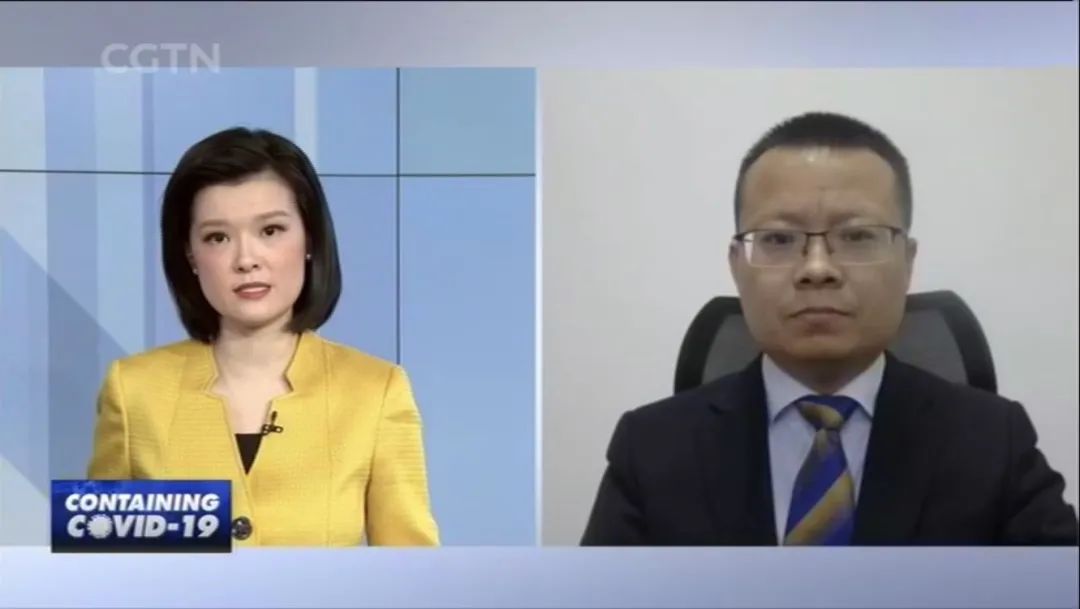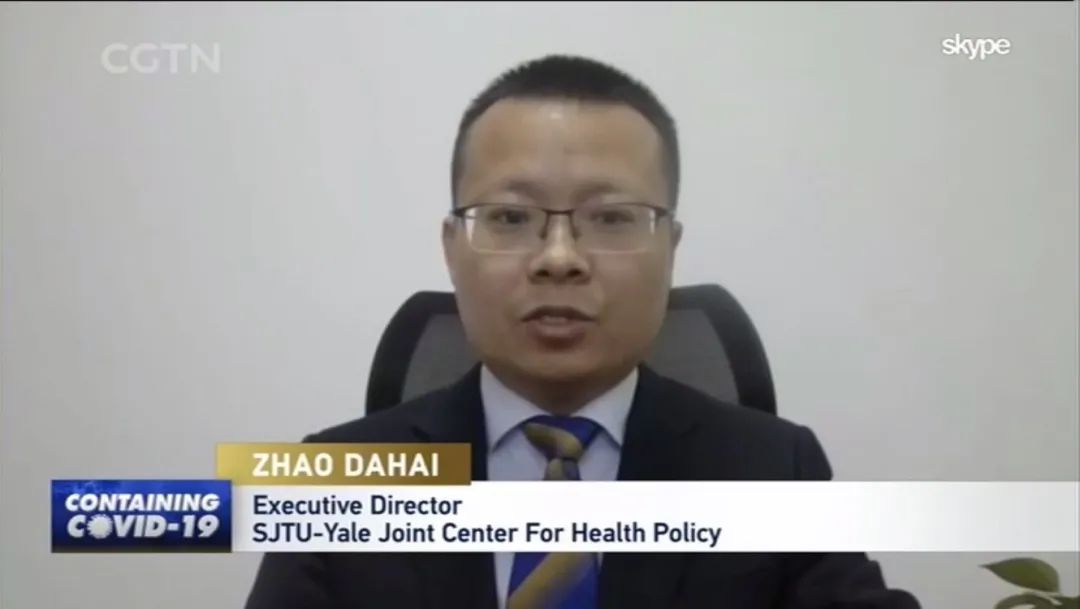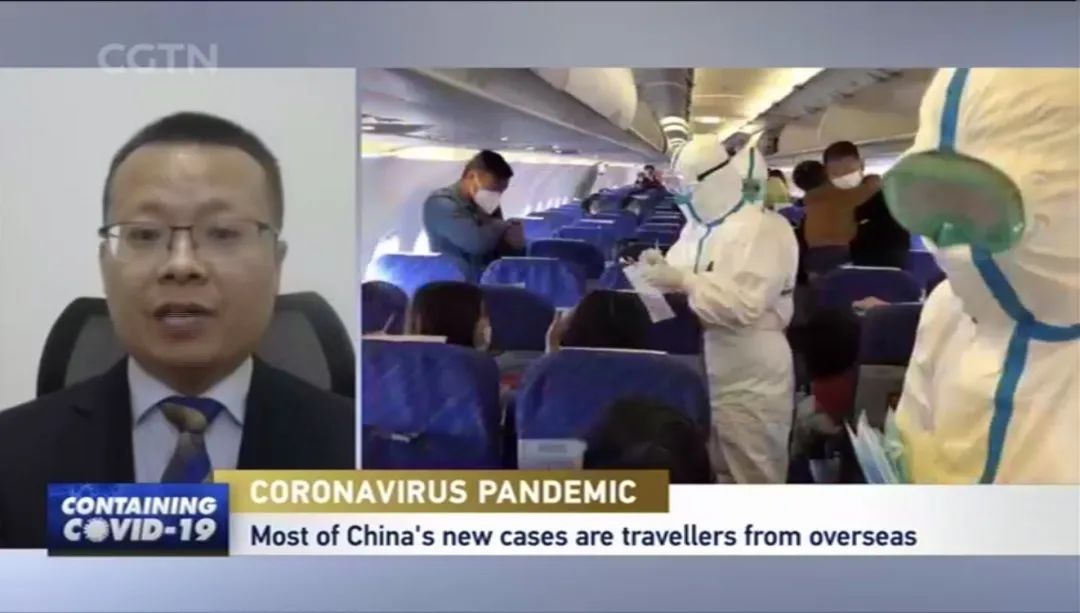上海交大赵大海关于新冠疫情第21次在电视台访谈评论:武汉解封时机正确,部分入境口岸需临时关闭


上海交通大学国际与公共事务学院博士生导师、上海交通大学-耶鲁大学卫生政策联合研究中心执行主任赵大海,自新冠肺炎疫情以来第14次在中央电视台进行直播评论,也是第21次在央视/上视进行直播评论。在2020年4月12日晚7点的中央电视台英语频道CGTN《今日亚洲》节目,赵大海就武汉解封的时机以及全国境外输入病例和边境地区的防控等进行了评论。现将主要内容翻译并摘录如下。
主持人:为了更为深入分析,我们邀请上海交通大学-耶鲁大学卫生政策联合中心执行主任赵大海进行评论。武汉在周三解除了为期11周的封城。您认为是太早了吗?中国如何防止疫情的再次反弹?
赵大海:考虑到在解除封城之前的三个多星期里,武汉市几乎已没有新的确诊病例了,而且全市所有潜在的密切接触者都已进行了核酸检测,因此,我相信解除封城的时机是合适的。如何防止疫情反弹确实是一项艰巨的任务。我认为武汉会有一些潜在的无症状感染者。因此,地方政府和公众都不能放松警惕。首先,居民出门时应该佩戴口罩。第二,在近期,尽量不要参加聚会和旅行。第三,公共场所应采取严格预防措施防止聚集性传染,譬如要测量体温,检查口罩和健康码等。第四,进一步推迟武汉学校的开学时间,至少比中国其他任何城市都得晚。

主持人:鉴于中国目前大多数新发病例都是境外输入的,您认为如何加强边境地区的疫情控制?
赵大海:首先,必须严格监控所有的入境口岸。所有入境人员必须在指定地点进行两周的隔离,必须全面实施对入境人员的闭环管理。此外,所有入境人员都不可以居家隔离,必须在他们入境的第一站在规定地点进行集中隔离。其次,边境地区应进一步限制每日的入境人数。相关政府部门应暂时关闭一些入境口岸。鉴于大多数边境地区都属于偏远地区,尤其是大多数的入境口岸都地处偏僻,那里普遍缺少医院和卫生人员,如果在入境口岸附近地区出现太多新发病例就很容易导致这些地区的疫情暴发。此外,如果一些入境口岸不能关闭,至少应尽量限制每日入境的人数。
主持人:有些人担心由境外输入和无症状感染者能引起我国新冠肺炎的第二次暴发,您怎么看待这个问题?
赵大海:首先,对入境人员的闭环管理是导致在中国是否会出现第二次暴发的关键。所有入境者必须在入境的第一站进行两周的集中隔离。确保所有入境入院在前两周没有机会接触到任何本土无特殊保护的居民。第二,应进一步重视无症状感染者。例如,据黑龙江省在昨天新闻发布会上的信息,一些新的确诊病例就是无症状感染者。因此,在全国,公众在近期最好不要参加聚会。此外,在即将到来的为期5天的劳动节期间,政府必须说服公众尽量不要旅游或参加聚会。如果我们能充分重视上述建议,我们就不用担心由于入境人员和无症状感染者所导致的第二次疫情暴发。
供稿者:国务学院
日期:2020年4月13日
Dahai Zhao' 21th comments on TV during the Pandemic: Right Time to Lift Wuhan Lockdown, Consideration of Some Ports Shutdown
Dahai Zhao, a doctoral supervisor at School of International and Public Affairs of Shanghai Jiao Tong University and Executive Director of Shanghai Jiao Tong University-Yale University Joint Research Center for Health Policy, has been interviewed by CGTV for the 14th time (the 21th time by CGTV / DFTV totally) since the COVID-19 pandemic. At 19:00 on April 12, 2020, Zhao commented on Wuhan to lift lockdown and ports shutdown on Asia Today.
Anchor: For more analyses, we're now joined via Skype by Zhao Dahai,Executive Director of Shanghai Jiao Tong University-Yale University Joint Center for Health Policy. Wuhan on Wednesday lifted its 11-week lockdown. Is it too soon? How can China prevent a rebound in cases?
Zhao: Considering there were almost no new confirmed cases in the last more than three weeks before the lift, and all potential close contacts of cases had been carefully tested, I believe the time is right. How to prevent a rebound is really a tough job. I believe there are also some potential asymptomatic cases in Wuhan. Therefore, local government and citizens cannot relax their guard. First, people should wear face masks when they go outside of home. Second, try not to attend gatherings and travel in the near future. Third, public areas should take pre-cautious measures to prevent the cluster infections. To check the temperature, face masks and Health QR code should be the regular measures. Fourth, further delay the re-start of the school in Wuhan, at least later than any other cities in China.
Anchor: Given that most new cases in China are imported, how should epidemic control be strengthened in border regions?
Zhao: First, all ports of entry to China must be strictly monitored. All incomers from abroad must be isolated at designated places for two weeks. The closed-loop management of incomers from abroad must be fully implemented. In addition, all incomers from abroad cannot be isolated at home, must be centrally isolated at designated places where they just arrived. Second, border regions try to further limit the daily numbers from abroad. Governments try to temporarily shut down some ports of entry to China. Most boarder regions, particularly for most ports of entry to China are remote areas where they have the shortage of hospitals and health care workers. If there are too many new cases of COVID-19 in the close areas of ports of entry, it is very easy to lead to an outbreak in these areas. In addition, if some ports of entry can not be shut down, at least try to limit the daily number of incomers at any entrances to China.
Anchor: Many are concerned about a second wave triggered by imported and asymptomatic cases. What's your take?
Zhao: First, the closed-loop management for all persons from abroad plays the vital role in whether there is a second-wave in China or not. All incomers must be centrally isolated for two weeks at the first arrival area. That is to say, no incomers who arrives in China in the first two weeks has the chance to contact any unprotective person in China. Second, the asymptomatic cases should be further paid attention. For example, in Heilongjiang, some new confirmed cases are confirmed as asymptomatic cases by yesterday’s news conference. therefore, in the whole China, people had better not attend gatherings in the near future. In addition, during the coming 5-day national holiday of Labor Day, governments must persuade people not to travel or to attend gatherings. If we can pay full attention to aforementioned suggestions, we will not worry about the second-wave triggered by imported and asymptomatic cases.
Contributor: SIPA, SJTU
Date: April 13

